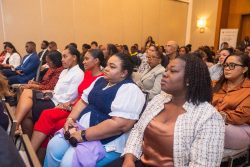Dear Editor,
The constitutional right of freedom of expression is subject to the caveat that this right cannot be exercised in such a manner which may prejudice or influence the outcome of a pending case, or, bring the administration of justice into disrepute. Indeed, any such expression constitutes a contempt of court.
It is public knowledge that President Bharrat Jagdeo has filed a libel suit against Mr Freddie Kissoon, Mr Adam Harris and the National Media and Publishing Company Limited, the publishers of the Kaieteur News, in respect of an article written by Mr Kissoon and published in the Kaieteur News. This case was filed on July 12, 2010, and the trial is scheduled to commence on August 19, 2011.
Mr Kissoon wrote two articles in the Kaieteur News on July 28, 2011 and July 29, 2011, about and concerning the case. The gravamen of his two articles, as I understand them, is that his case has been fixed for trial too early and as a result, he is now apprehensive that he may not receive a fair trial. The general tenor of the two articles leads one to the inescapable conclusion that the author is suggesting that the administration of justice has been improperly influenced to bring about an early hearing of his case and such improper influence may extend to the decision of the case. Indeed, these are most grave allegations. They assume even greater magnitude when they are made by a party involved in the litigation.
Maybe Mr Kissoon is unaware that during the course of the hearing of the injunction proceedings before the Honourable Chief Justice, his lawyers had requested that if the injunction is made interlocutory, then an early date should be fixed for a trial of the action. At this point in time, the requisite pleadings were already filed by both sides. The Chief Justice granted this request and as a result, I was ordered to file a Request for Hearing within two days after the injunction was made interlocutory. This, I did. Then an appeal was launched against the Chief Justice’s decision which made the injunction interlocutory. Under the relevant Rules of Court, a case cannot go to trial unless all interlocutory matters are concluded. Therefore, this appeal must be determined before the trial of the matter can commence. The appeal in such matters lies to the Full Court of the High Court.
Again, Mr Kissoon seems unaware that one of his lawyers, again, requested of the Chief Justice to constitute the Full Court to hear and determine the appeal so that the trial of the case can commence. Again, the Chief Justice granted their request and the appeal was heard and determined, thereby paving the way for the trial to commence. Out of an abundance of caution, I took the opportunity of confirming the aforesaid information with the Chief Justice before I penned this missive. There-fore, Mr Kissoon’s fears, apprehensions and anxieties are completely misplaced.
Yours faithfully,
Mohabir Anil Nandlall, MP
Attorney-at-Law for
President Bharrat Jagdeo





